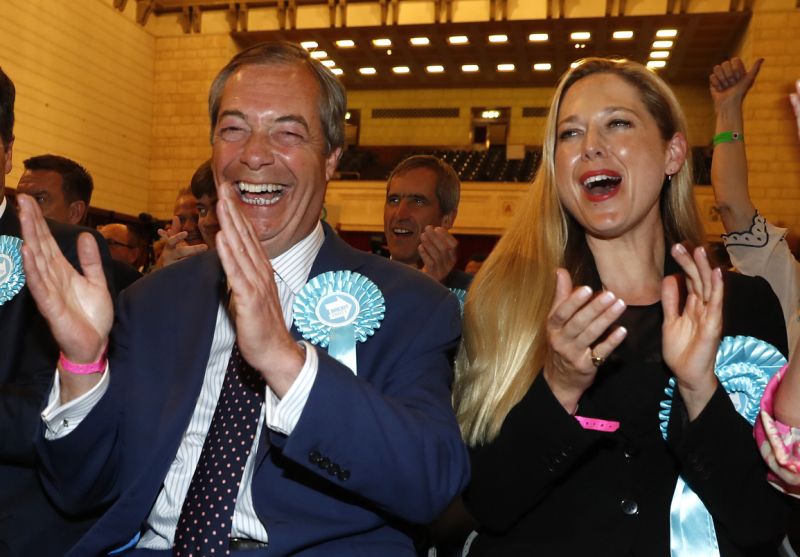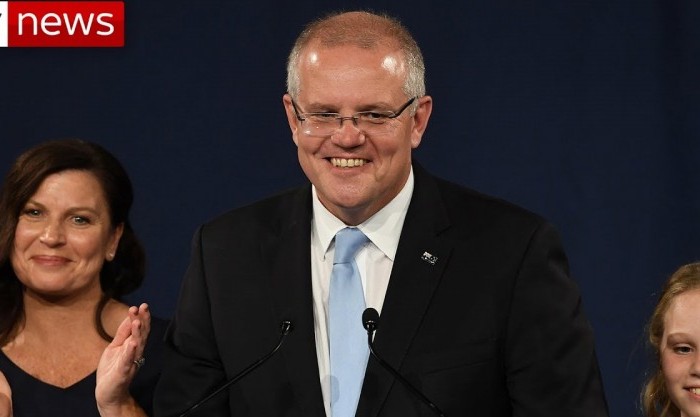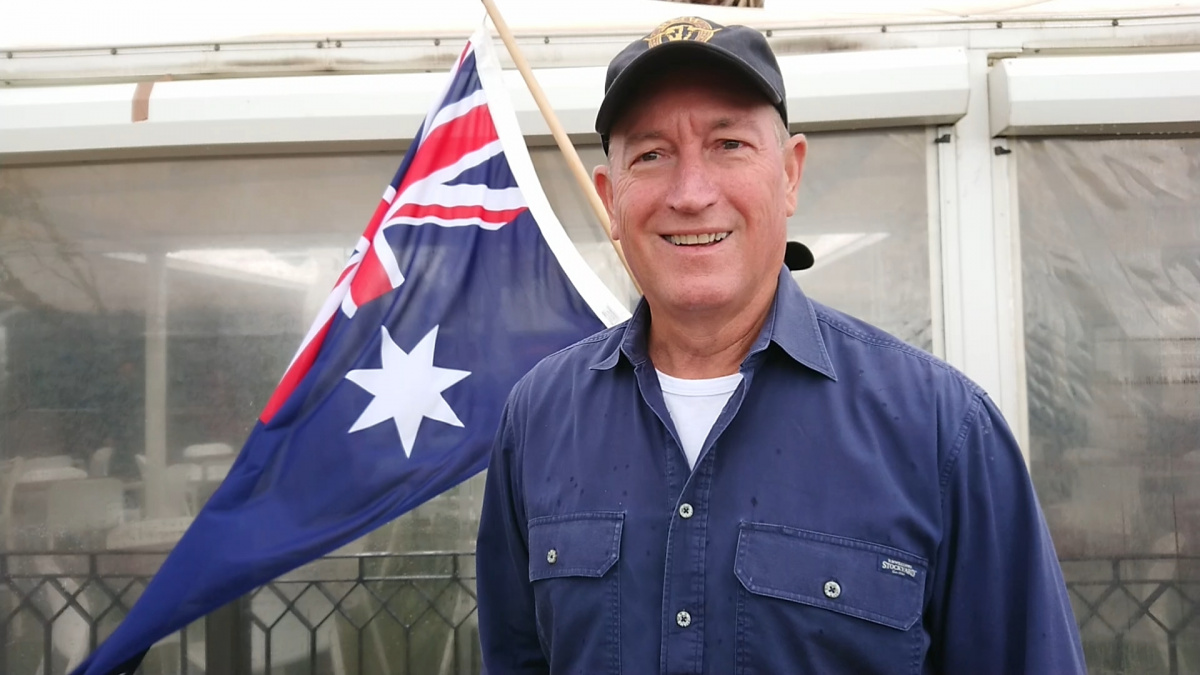|
[Majorityrights Central] An approaching moment of Russian clarity Posted by Guessedworker on Sunday, 11 May 2025 12:34. [Majorityrights Central] “It’s started. You ignored us. See where it’s going to get you.” Posted by Guessedworker on Sunday, 04 May 2025 00:42. [Majorityrights News] Another dramatic degradation of Russia’s combat capacity Posted by Guessedworker on Wednesday, 23 April 2025 08:49. [Majorityrights Central] A British woman in Ukraine and an observer of Putin’s war Posted by Guessedworker on Monday, 14 April 2025 00:04. [Majorityrights News] France24 puts an end to Moscow’s lie about the attack on Kryvyi Riy Posted by Guessedworker on Monday, 07 April 2025 17:02. [Majorityrights News] If this is an inflection point Posted by Guessedworker on Thursday, 03 April 2025 05:10. [Majorityrights News] Sikorski on point Posted by Guessedworker on Friday, 28 March 2025 18:08. [Majorityrights Central] Piece by peace Posted by Guessedworker on Wednesday, 19 March 2025 08:46. [Majorityrights News] Shame in the Oval Office Posted by Guessedworker on Saturday, 01 March 2025 00:23. [Majorityrights News] A father and a just cause Posted by Guessedworker on Tuesday, 25 February 2025 23:21. [Majorityrights Central] Into the authoritarian future Posted by Guessedworker on Friday, 21 February 2025 12:51. [Majorityrights Central] On an image now lost: Part 2 Posted by Guessedworker on Saturday, 15 February 2025 14:21. [Majorityrights News] Richard Williamson, 8th March 1940 - 29th January 2025 Posted by Guessedworker on Monday, 03 February 2025 10:30. [Majorityrights Central] Freedom’s actualisation and a debased coin: Part 2 Posted by Guessedworker on Saturday, 11 January 2025 01:08. [Majorityrights News] KP interview with James Gilmore, former diplomat and insider from first Trump administration Posted by Guessedworker on Sunday, 05 January 2025 00:35. [Majorityrights Central] Aletheia shakes free her golden locks at The Telegraph Posted by Guessedworker on Saturday, 04 January 2025 23:06. [Majorityrights News] Former Putin economic advisor on Putin’s global strategy Posted by Guessedworker on Monday, 30 December 2024 15:40. [Majorityrights News] Trump will ‘arm Ukraine to the teeth’ if Putin won’t negotiate ceasefire Posted by Guessedworker on Tuesday, 12 November 2024 16:20. [Majorityrights News] Olukemi Olufunto Adegoke Badenoch wins Tory leadership election Posted by Guessedworker on Saturday, 02 November 2024 22:56. [Majorityrights News] What can the Ukrainian ammo storage hits achieve? Posted by Guessedworker on Saturday, 21 September 2024 22:55. [Majorityrights Central] An Ancient Race In The Myths Of Time Posted by James Bowery on Wednesday, 21 August 2024 15:26. [Majorityrights Central] Slaying The Dragon Posted by James Bowery on Monday, 05 August 2024 15:32. [Majorityrights Central] The legacy of Southport Posted by Guessedworker on Friday, 02 August 2024 07:34. [Majorityrights News] Farage only goes down on one knee. Posted by Guessedworker on Saturday, 29 June 2024 06:55. [Majorityrights News] An educated Russian man in the street says his piece Posted by Guessedworker on Wednesday, 19 June 2024 17:27. [Majorityrights Central] Freedom’s actualisation and a debased coin: Part 1 Posted by Guessedworker on Friday, 07 June 2024 10:53. [Majorityrights News] Computer say no Posted by Guessedworker on Thursday, 09 May 2024 15:17. [Majorityrights News] Be it enacted by the people of the state of Oklahoma Posted by Guessedworker on Saturday, 27 April 2024 09:35. [Majorityrights Central] Ukraine, Israel, Taiwan … defend or desert Posted by Guessedworker on Sunday, 14 April 2024 10:34. [Majorityrights News] Moscow’s Bataclan Posted by Guessedworker on Friday, 22 March 2024 22:22. [Majorityrights News] Soren Renner Is Dead Posted by James Bowery on Thursday, 21 March 2024 13:50. [Majorityrights News] Collett sets the record straight Posted by Guessedworker on Thursday, 14 March 2024 17:41. [Majorityrights Central] Patriotic Alternative given the black spot Posted by Guessedworker on Thursday, 14 March 2024 17:14. [Majorityrights Central] On Spengler and the inevitable Posted by Guessedworker on Wednesday, 21 February 2024 17:33.  Brexit Party leader Nigel Farage, left, reacts as results are announced at the counting center for the European Elections for South East England region, in Southampton, England, Sunday, May 26, 2019. (AP Photo/Alastair Grant) Brexit Party leader Nigel Farage, left, reacts as results are announced at the counting center for the European Elections for South East England region, in Southampton, England, Sunday, May 26, 2019. (AP Photo/Alastair Grant)Yahoo/Associated Press News, 27 May 2019: LONDON (AP): Britain’s governing Conservative Party was all but wiped out in European Parliament election as voters sick of the country’s stalled European Union exit flocked to uncompromisingly pro-Brexit or pro-EU parties. The main opposition Labour Party also faced a drubbing in a vote that upended the traditional order of British politics and plunged the country into even more Brexit uncertainty. The big winners were the newly founded Brexit Party led by veteran anti-EU campaigner Nigel Farage and the strongly pro-European Liberal Democrats. With results announced early Monday for all of England and Wales, the Brexit Party had won 28 of the 73 British EU seats up for grabs and almost a third of the votes. The Liberal Democrats took about 20% of the vote and 15 seats — up from only one at the last EU election in 2014. Labour came third with 10 seats, followed by the Greens with seven. The ruling Conservatives were in fifth place with just three EU seats and under 10% of the vote. Scotland and Northern Ireland are due to announce their results later. Farage’s Brexit Party was one of several nationalist and populist parties making gains across the continent in an election that saw erosion of support for the traditionally dominant political parties. Conservative Foreign Secretary Jeremy Hunt said it was a “painful result” and warned there was an “existential risk to our party unless we now come together and get Brexit done.” The results reflect an electorate deeply divided over Britain’s 2016 decision to leave the EU, but united in anger at the two long-dominant parties, the Conservatives and Labour, who have brought the Brexit process to deadlock. Britain is participating in the EU election because it is still a member of the bloc, but the lawmakers it elects will only sit in the European Parliament until the country leaves the EU, which is currently scheduled for Oct. 31. Farage’s Brexit Party was officially launched in April and has only one policy: for Britain to leave the EU as soon as possible, even without a divorce agreement in place. Farage said his party’s performance was “a massive message” for the Conservatives and Labour, and he said it should be given a role in future negotiations with the EU. “If we don’t leave on Oct. 31, then the scores you have seen for the Brexit Party today will be repeated in a general election — and we are getting ready for it,” said Farage. But the election leaves Britain’s EU exit ever more uncertain, with both Brexiteers and pro-EU “remainers” able to claim strong support. Labour and the Conservatives, who in different ways each sought a compromise Brexit, were hammered. The result raises the likelihood of a chaotic “no deal” exit from the EU — but also of a new referendum that could reverse the decision to leave. The Conservatives were punished for failing to take the country out of the EU on March 29 as promised, a failure that led Prime Minister Theresa May to announce Friday that she is stepping down from leading the party on June 7. Britain’s new prime minister will be whoever wins the Conservative party leadership race to replace her. The favorites, including ex-Brexit Secretary Dominic Raab and former Foreign Secretary Boris Johnson, have vowed to leave the EU on Oct. 31 even if there is no deal in place. Most businesses and economists think that would cause economic turmoil and plunge Britain into recession. But many Conservatives think embracing a no-deal Brexit may be the only way to win back voters from Farage’s party. Labour was punished for a fence-sitting Brexit policy that saw the party dither over whether to support a new referendum that could halt Brexit. Labour foreign affairs spokeswoman Emily Thornberry said the party needed to adopt a clearer pro-EU stance. “There should be a (new Brexit) referendum and we should campaign to remain,” she said. ___ For more news from The Associated Press on the European Parliament elections go to https://www.apnews.com/EuropeanParliament ___ Follow AP’s full coverage of Brexit at: https://www.apnews.com/Brexit
Or is it rather unite and conquer? ......unite right wing reactionaries against “the left” (don’t be so “divisive” as to “punch right”) and conquer (erstwhile White/ethnonational social systemic homeostasis)? With Majorityrights having recently been taken off of the WN/news aggregate site formerly known as “the White Right Hub” and now the “Goebbels Report” after MR had the nerve to question the wisdom of their promoting “The Greatest Story Never Told” in the name of White morale and unity? as it features wholesale lies from Goebbels - e.g., that Poles killed 58,000 German civilians interwar - in order to “justify” invasion of Poland…the question comes into relief again: What part is Regnery playing in promoting the socially disorganizing right wing identity among Whites in their reaction to affliction? and is a Germanic/Jewish element among Regnery using this to promote divide and conquer among Whites? What begs these questions?  Following MR having called-out the White Right Hub for featuring this highly inaccurate and destructive propaganda, they did replace the feature (“Greatest Story Never Told”), with a headline of a Polish woman who had a child with a black, who then, typically, abandoned her. A comment appeared on MR - “LOL, you (DanielS) were being trolled and didn’t even realize it.” This is quite Jewy. I cannot imagine mocking Germans for their mudsharks. And it casts suspicion on this spirit of unity that these right wingers claim to be promoting and how I am the one supposedly sowing discord. Not long after, none other than Regnery’s pet, Richard Spencer, was being featured atop The Goebbels Report… ...tagging along on this occasion was a new luminary in the Regnery right wing tentosphere, Josh Neal, who, in turn, is apparently being encouraged to bring along other nubies on the WN scene, like Richard Houck, to play the same old Regnery German/Jewish game of pandering to the White American demographic in their reaction. Regnery is apparently sponsoring much of the dubious right wing White identity - such as Richard Spencer’s NPI and Mike Enoch’s TRS. Norvin tells me that a character going by the nom de plume of “Privada” is acting as a producer (gate-keeper) for those going on (what I’m guessing is) the Rengery approved circuit. Related at Majorityrights: On The Regnery Circus Big-Tent-O-Sphere, Featuring Richard Spencer as its Ring-Master  Regnery and Spencer, central umbrellas in the Regnery Tentosphere. Richard Thpenther thays, “If you’re not right on “the PQ” (Polish question), we’re going to purge you from thith movement” - (((Alternative Right))). Regnery and Spencer, central umbrellas in the Regnery Tentosphere. Richard Thpenther thays, “If you’re not right on “the PQ” (Polish question), we’re going to purge you from thith movement” - (((Alternative Right))).
Again, Regnery is known to sponsor many right wing projects, including those that “White Nationalists” are involved in, apparently sponsoring TRS (see here, here and here as to why that’s particularly dubious) in addition to Spencer’s NPI (among the manifold dubiousness of that outfit, for example, here). Below are samples from the most recent tweet to tweets not far down the line (even though some of the dates are old) from Regnery president, Marj Ross, indicating a kosher aesthetic.
Alexandra Levine with ‘Jews for Trump’ discusses Trump, Israel & being a Conservative Jew
.................................................. Paul Gottfried, Gilad Atzmon and David Cole Stein are three ready examples of Jews who are taking the kind of right wing and philo-Germanic perspective that is characteristic of the Regnery circus (even if Stein and Atzmon are not published by Regnery, they are common as “the good Jews” among Regnery discourse-promotional circuits).
Related at Majorityrights: Kristol>NeoCon>Meyer>Paleocon> Gottfried>Francis>NPI> Gottfried>AltRight/lite> Paleocon>Bannon>Trump Richard Thpenther’s (((Altright tentosphere))): “PQ” (Polish question), Goldstein’s false opposition On The Regnery Circus Big-Tent-O-Sphere, Featuring Richard Spencer as its Ring-Master From whence comes the eclecticism of the alternative right big tent concept. The Alternative-Right’s big tent, would additionally include the Jews for some unknown reason. The alternative right’s big tent, already too inclusive - includes Jews as well Big Tent quartermasters faced with fresh spate of pro-Jewish pandering from Donald Trump. Unite the Right Charlottesville: successful neocon/liberal operation forces wedge against paleo-Cohn
As a Remain voter to begin with, Theresa May’s Prime Ministership looked more and more like a grand filibuster to obstruct Brexit indefinitely. And, as Allister Heath said over at the Daily Telegraph, 22 May 2019:
 Australian Prime Minister Scott Morrison has thanked voters for re-electing his conservative coalition in a shock result at the federal polls. Australian Prime Minister Scott Morrison has thanked voters for re-electing his conservative coalition in a shock result at the federal polls.
 In another development, controversial right-winger Fraser Anning failed to regain his Senate seat. Fraser Anning cleared over ‘egg boy’ clash. Attack victims honoured in Christchurch. While in the Senate, he had called for preference to be given to white immigrants, used the Nazi-related phrase “final solution” while discussing immigration, and blamed the Christchurch shootings on Muslim immigration. In another development, controversial right-winger Fraser Anning failed to regain his Senate seat. Fraser Anning cleared over ‘egg boy’ clash. Attack victims honoured in Christchurch. While in the Senate, he had called for preference to be given to white immigrants, used the Nazi-related phrase “final solution” while discussing immigration, and blamed the Christchurch shootings on Muslim immigration.
 Without children, Italians have no future. Without children, Italians have no future.“Because of the insane austerity in Brussels, hundreds of children are DYING in Greece… I do not care to have the accounts in place and the cemeteries full, I want for every Italian to be able to afford to found a family with a stable job… Without children, Italians have no future.” Matteo Salvini
Page 76 of 230 | First Page | Previous Page | [ 74 ] [ 75 ] [ 76 ] [ 77 ] [ 78 ] | Next Page | Last Page |
|

Existential IssuesDNA NationsCategoriesContributorsEach author's name links to a list of all articles posted by the writer. LinksEndorsement not implied. Immigration
Islamist Threat
Anti-white Media Networks Audio/Video
Crime
Economics
Education General
Historical Re-Evaluation Controlled Opposition
Nationalist Political Parties
Science Europeans in Africa
Of Note MR Central & News— CENTRAL— An approaching moment of Russian clarity by Guessedworker on Sunday, 11 May 2025 12:34. (View) Piece by peace by Guessedworker on Wednesday, 19 March 2025 08:46. (View) Into the authoritarian future by Guessedworker on Friday, 21 February 2025 12:51. (View) — NEWS — If this is an inflection point by Guessedworker on Thursday, 03 April 2025 05:10. (View) Sikorski on point by Guessedworker on Friday, 28 March 2025 18:08. (View) Shame in the Oval Office by Guessedworker on Saturday, 01 March 2025 00:23. (View) CommentsThorn commented in entry 'Soren Renner Is Dead' on Sun, 05 May 2024 22:12. (View) James Marr commented in entry 'Soren Renner Is Dead' on Sun, 05 May 2024 12:56. (View) Manc commented in entry 'Soren Renner Is Dead' on Sun, 05 May 2024 10:23. (View) Thorn commented in entry 'Soren Renner Is Dead' on Sun, 05 May 2024 09:44. (View) Al Ross commented in entry 'Soren Renner Is Dead' on Sun, 05 May 2024 04:57. (View) Al Ross commented in entry 'Soren Renner Is Dead' on Sun, 05 May 2024 02:34. (View) Thorn commented in entry 'Soren Renner Is Dead' on Fri, 03 May 2024 23:04. (View) Al Ross commented in entry 'Soren Renner Is Dead' on Thu, 02 May 2024 04:26. (View) Al Ross commented in entry 'Soren Renner Is Dead' on Thu, 02 May 2024 03:35. (View) Al Ross commented in entry 'Soren Renner Is Dead' on Thu, 02 May 2024 03:12. (View)  
|